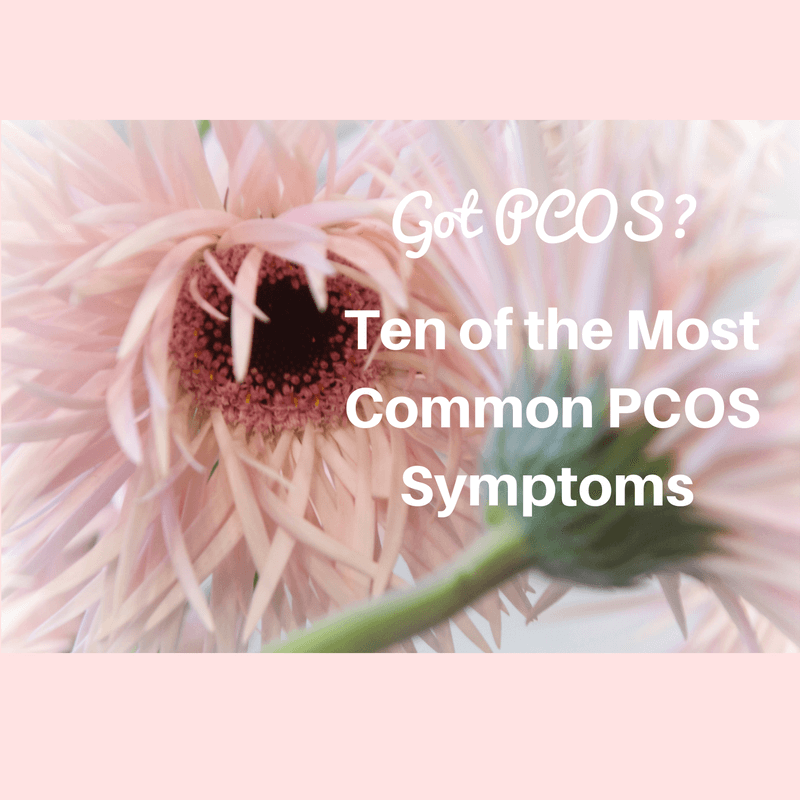Got PCOS? Ten of the Most Common PCOS Symptoms: What to Watch Out For
Being able to identifythe common PCOS symptoms is SO very critical for receiving an effective diagnosis. Without a proper diagnosis, a women with PCOS cannot receive the proper medical treatment. Yet, so many women experience a myriad of PCOS symptoms but never report them to their medical providers. Did you know PCOS is the most prevalent hormone imbalance in women under the age of 50? Yet nearly 70% of all cases are undiagnosed. The statistics are astounding! Furthermore, one out every fifteen women worldwide struggles with PCOS. This is especially relevant because if left untreated, PCOS can lead to more far reaching health concerns, such as diabetes, heart disease and endometrial cancer.
Most women with PCOS primary health issues stem from an overabundance of androgens (male hormones) and insulin resistance. Classic PCOS symptoms include: infertility, irregular menstrual cycles, excessive hair growth and elevated weight. Even though the name of the syndrome is Polycystic Ovarian Syndrome – it is possible to have PCOS WITHOUT having cysts in your ovaries. So don’t freak out if you don’t have ovarian cysts and are still diagnosed with the syndrome.
Symptoms of PCOS may begin shortly after puberty. Some of the signs and symptoms can be attributed to other causes or go unnoticed, which makes diagnosing PCOS difficult. Below are some of the most common symptoms of PCOS. Please be mindful that this list is by no means all-inclusive. Due to the fact that PCOS is disorder of hormonal imbalance – symptoms vary tremendously from women to women.
Ten of the Most Common PCOS Symptoms
1. Irregular periods. This is the most common characteristic of PCOS. This can include having irregular menstrual intervals or having prolonged menses that are either scant or super heavy.
2. Excess androgen levels. Elevated levels of male hormones called androgens is a classic symptom of PCOS and can lead to problems with weight, excessive hair growth, acne, and baldness.
3. Polycystic ovaries. Women with PCOS may or may not have cysts on their ovaries. The cysts associated with PCOS are actually eggs that do not get released from the ovary because of abnormal hormone levels.
4. Issues with weight gain. About half of women with PCOS struggle with weight gain and obesity. Many women have difficulty losing weight despite making dietary changes.
5. Unwanted hair growth. Women with PCOS may experience excessive hair growth on their face, arms, back, chest, thumbs, toes, and abdomen as a result of hormonal changes.
6. Acne. Hormonal changes can also lead to issues with acne or other skin issues such as skin tags or darkened patches of skin.
7. Fatigue and sleep problems. Many women with PCOS have lower energy levels and issues with poor sleep.
8. Thinning hair on head. This symptom may be more noticeable during middle age.
9. Infertility. PCOS is one of the leading causes of infertility.
10. Headaches and mood changes. Hormonal changes can prompt headaches and increase the likelihood of mood swings, depression, and anxiety.
Take Action!
In concPlease, please, please promise me if you have any of these symptoms that you will be super proactive with your health! You are important girl friend and deserve the proper treatment. Many women who experience the symptoms of PCOS suffer silently. They are often too embarrassed, or feel the symptoms could be perceived as an awkward phase of sexual development, reactions to stress or poor lifestyle choices, or even false concerns with a less-than-perfect body. Therefore, rather than speak up and express their concern they chock them up to “female problems.” And as a result, are unable to get the appropriate diagnosis and treatment plan.
Yes, they are female problems – but they are important female problems that need your direct attention and those who help keep you healthy (doctors!) Under no circumstances should you have to suffer. If your regular OBGYN will not listen and address your concerns – then seek someone out who will. Monitor and document any changes to your appearance (especially your skin and hair), as well as any unexplained weight gain and menstrual irregularity. Collect data and never ever give up.
I have seen far too many women struggle for far too long in my practice. It absolutely blows my mind when patients come to see me and have a myriad of undeniable PCOS-related symptoms and NOT ONE of their doctors has done one thing aside from tell them to “exercise more and lose weight”. If only it was that easy! Geez!

Having PCOS should not define you, but a proper diagnosis is necessary to define your treatment plan.
In conclusion, you need to be proactive with your health and report all the symptoms of PCOS you may be experiencing. I do my best to keep you informed about what you should be doing from a dietary standpoint – but sometimes that just not enough. You need to be heard and something needs to be done to help you with these symptoms. And please remember … it is not you – it is your body!
Do these symptoms sound familiar? Have you or someone you know been suffering with these symptoms and no one in the medical field seems willing to listen, understand and help do something about them? Please share your frustrating experiences with the medical community in the comments below. I think so many women can benefit from hearing your story! Now is the time to vent. We are listening and have your back.



